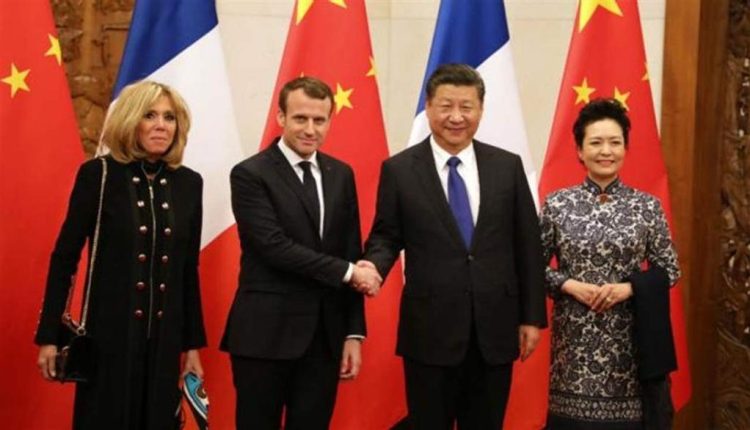“STRATEGIC INDEPENDENCE” IS THE MOST IMPORTANT RESULT OF THE FRENCH-EUROPEAN VISIT TO CHINA

By General Monzer El Ayoubi

Translation: Pierre sarkis
Following French President Emmanuel Macron’s visit to China and his three-day meeting with his counterpart Xi Jinping, with the participation of European Commission President Ursula von der Leyen, the French newspaper Les Echos published the content of an interview conducted by journalist Nicolas Barre with Macron. For the first time, it included his vision and call on the European Union to stop its approach of dependency on the United States and work to achieve “strategic independence.”
In principle, the option of strategic decision-making independence comes to include the political, military and economic aspects of the state or union. The question here is whether Europe has this ability, in light of international changes and alignments, especially with the flare-up and continuation of the Russian-Ukrainian War. In the least obligations to achieve the desired number of items, not the least without limitations:
• The stability of the deep state or the union with the drawing of a comprehensive and rational supreme strategy.
• The independence of political decision-making in isolation from Washington in particular whether in international relations, military alliances or economic treaties etc.
• Achieving a unified defense plan which guarantees military sufficiency in manufacturing and arming, and here the idea of establishing a unified European army which was previously put forward by the French President in 2019, without prejudice to the structure of NATO, is restored, or else leave the membership.
• Strengthening the role of financial institutions and the European Investment Bank, reducing dependence on the US dollar in trade exchanges, adjusting supply chains and diversifying energy and food sources.
• Upgrading the level of digital manufacturing of electronic connectors and chips with the adoption of a gradual program that leads to closing the technical gap in time, ensuring that there is no need to some extent for products from China and Taiwan etc.
In the same context, the pursuit of the goal of Europe’s “strategic independence” will enshrine multipolarity on the international stage. This contradicts the core strategy of the main ally the United States of America and weakens its influence, but it is in harmony with the role of Russia and China. In the position of transformation, sorting the roles based on capabilities and abilities, this ambition will lead the two qualified European countries, France and Germany. However, Britain will not hesitate to stay with its strategic ally the United States if it does not form a Trojan horse, which was evident in 2019, when it withdrew from the European Union while maintaining some aspects of the customs union between Northern Ireland and the European single market, to prevent hard borders i.e. the crossings of people and goods through the official crossings separating the two parts of the Irish island, and avoid the latter’s renunciation of the “Good Friday Agreement”, or the Belfast Agreement that ended sectarian confessional civil war between Catholics and Protestants.
On the other hand, the visit expressed a desire to establish and declare a unified and independent European position at the strategic level. Regardless of its future results, it is a need and an important step for re-communication, especially after the Chinese President welcomed Macron’s announcement rejecting Europe’s dependence on Washington or Beijing in the Taiwan Island issue, in addition to completing contracts for huge commercial deals (opening a European air bus manufacturing facility) in the Northern city of Tianjin.
In the American position, Washington did not stomach the European step and did not hide its suspicion of the reasons and positions previously announced by President Macron, as he does not hide his reservation about US President Joe Biden’s quest to push his European allies to take tougher positions towards China, under the pretext of its unbalanced and unfair economic and industrial practices, along with its violations of human rights. The visit of US House Speaker Nancy Pelosi to Taiwan, as well as, a subsequent visit by a congressional delegation, along with the recent US-Philippine military exercises, fueled the crisis with Taiwan from his perspective. In addition, he considered the visit of Taiwan President Tsai Ing-Wen to New York earlier this month and her meeting with House Speaker Kevin McCarthy infuriating Beijing, as an unnecessary provocative step. This was followed by a coordinated invitation by the French and Chinese presidents to Russian-Ukrainian peace talks, especially after the latter’s visit to Moscow and his meeting with Russian President Vladimir Putin within the framework of their strategic alliance.
Finally, it is inevitable to adopt a new strategy for European national security based on the sovereignty and freedom of decision-making, as the dilemma before the Union (France and Germany in particular) is how to balance the continuity of the strategic alliance with Washington and support for the latter’s biased and adopted position on Taipei, on the one hand, and the preservation of enormous economic, commercial and investment interests with Beijing on the other; a conflict in its political depth between two dictatorial and democratic regimes belonging to the free world. As for the troubling and ever constant question in Europe: what if China invaded Taiwan? Is there any ability to disengage the economy between Europe and China, as happened with Russia against the backdrop of the invasion of Ukraine?
In strategies and international relations, there is no ambiguity, nor is there a place for the phrase “things depend on their times…”
Beirut, 15/04/2023
Scholar in Security and Strategic Affairs

